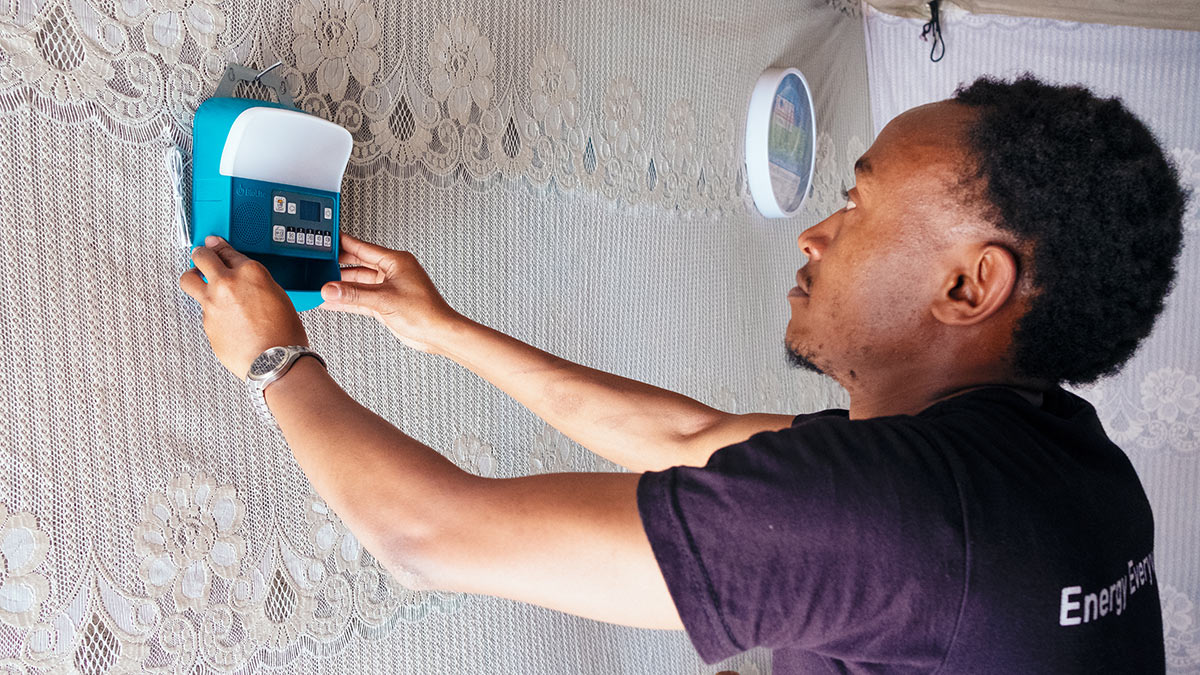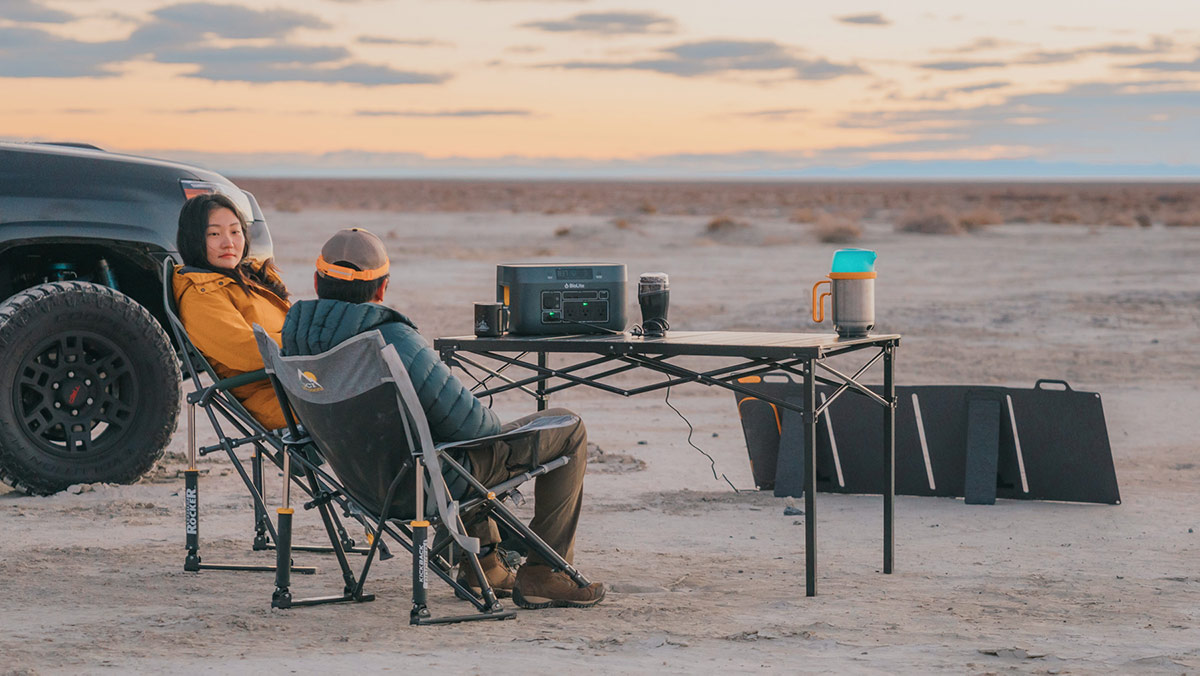Once we spend time outdoors, we regularly make selections and mull tradeoffs: Does the climate demand a down jacket or artificial? Ought to we paddle a canoe or a kayak? Hop on a highway bike or a mountain bike?
However tradeoffs didn’t enchantment to Jonathan Cedar and Alec Drummond. Selecting one path or one other felt like limiting their ambitions. Why not attempt to do extra, on a regular basis? they questioned. Why not assume “and” when others thought “or”? Gear maker BioLite, Cedar and Drummond’s firm, has constructed success on this philosophy.
BioLite unites the duo’s love of the outside with a ardour for engineering and design. Their merchandise present greater than warmth and lightweight. They assist prospects within the out of doors recreation market and people in lower-income nations prepare dinner, cost gadgets and illuminate their houses and different areas off the grid— all whereas balancing earnings with a dedication to environmental and humanitarian targets.
And not or.

Since launching 15 years in the past, BioLite has grown from a small enterprise producing environment friendly, wood-burning stoves for tenting to a worldwide firm with a purpose to offer entry to inexpensive clear vitality for 20 million individuals in off-grid households. By means of retailers like REI, BioLite sells merchandise starting from rechargeable headlamps and lanterns for tenting to photo voltaic panels and moveable energy stations that may electrify houses or campsites. Its prospects span North America, Europe and greater than 20 nations in Africa; and it has 95 workers in New York and Kenya.
BioLite began as corporations typically do—when its founders seen an issue in want of an answer. Cedar and Drummond have been passionate out of doors lovers who didn’t like utilizing petrol-powered camp stoves. They wished a cleaner different that they may gas with abundantly accessible wooden and twigs. The 2 have been additionally expert engineers who labored collectively at an industrial design agency. Round 2006, the buddies started tinkering. As they delved into the world of wood-burning stoves, they attended a convention within the area. They have been shocked to seek out that about one-third of the world’s inhabitants cooks over open fires or inefficient stoves that use kerosene or coal, which is dear and pollutes the air.
The 2 knew they may do higher.
“It simply felt like such a tremendous alternative,” mentioned Cedar, CEO of BioLite. “That is the place I get to contribute to the local weather drawback by vitality options.”
Balancing Outside and Rising Markets
However the enterprise confronted a paradox. The out of doors recreation market had larger margins and clear avenues for distribution and gross sales however was comparatively small. The cookstove market in lower-income nations was large, nevertheless it had low margins and the gross sales infrastructure was both fragmented or nonexistent. Funding was one other problem. The corporate might search philanthropic {dollars}, however that would depart it depending on the whims of donations or grants.
So BioLite’s founders opted for a distinct technique. They pursued a enterprise mannequin constructed on “parallel innovation” the place the 2 markets might stabilize one another. Whereas customers within the out of doors and rising markets had totally different wants, the know-how was basically the identical. The unconventional method discovered help from one in all its early buyers, a fund created by Clayton Christensen, a Harvard professor who pioneered the speculation of “disruptive innovation” and new fashions to serve unmet market wants.

In 2012 the startup launched its first product for the out of doors market. The BioLite CampStove burns sticks and twigs, utilizing the warmth generated to spin a small fan that feeds the flames and creates a extra environment friendly, smokeless hearth. It additionally features a distinctive know-how that harnesses waste warmth and converts it into electrical energy that flows right into a USB port for charging telephones and different gadgets. (REI was an early retailer of the CampStove, serving to the then-small firm scale its enterprise on the time). BioLite then started promoting a bigger mannequin, HomeStove, with a barely totally different configuration for customers in India and Uganda.
Quickly, BioLite shifted its rising market focus to a number of African nations and commenced producing environment friendly, charcoal-fueled stoves that lower gas consumption and lowered poisonous emissions. Prospects might pay for the stoves over time by digital fee plans, utilizing the cash they saved from burning much less gas and free telephone charging to assist finance the gadgets. Then, in 2017, the corporate began promoting carbon offsets for the stoves, calculating the quantity of planet-warming pollution that have been averted through the use of BioLite merchandise. The carbon offsets additionally allow them to decrease the value of the stoves. (REI purchased carbon credit from the BioLite Improved Range Programme in Uganda as a part of its dedication to halve its emissions and to cut back its greenhouse fuel emissions 55% by 2030 whereas offsetting some emissions.)
However BioLite was simply getting began.
Going photo voltaic
“It was at all times our intention to be an vitality firm and do cooking, charging, lighting,” Cedar mentioned.
In 2015, the corporate developed and launched its first non-stove product: the PowerLight, a light-weight, USB rechargeable lantern. It was finally changed by the AlpenGlow lantern that’s good for tenting or yard hangouts. Then got here the FirePit, which utilized BioLite’s smokeless tech to the normal campfire.
Two years later, BioLite made the leap into bigger solar energy methods for electrifying houses in rising markets. Worldwide, greater than 700 million individuals lack electrical energy. For many, off-grid photo voltaic is the most affordable, quickest answer for accessing energy, stories GOGLA, the worldwide affiliation for the off-grid photo voltaic business based mostly within the Netherlands.
“Firms like BioLite have performed a basic function in enabling 420 million individuals to realize vitality entry within the final decade. Many of those individuals would have in any other case remained at midnight,” mentioned Koen Peters, GOGLA’s government director, by e-mail.
BioLite started promoting SolarHome 620 in Africa in 2017, after which as a restricted launch in high-income nations. One of many challenges of promoting solar energy in distant environments is ensuring the house gadgets are easy sufficient to put in so {that a} non-electrician can do it. In 2021, the corporate unveiled BioLite Academy, a curriculum delivered through cell telephones to coach individuals to put in the methods.

The following frontier is its Photo voltaic Generator System, which incorporates BaseCharge, a conveyable energy station that may be charged through a typical wall outlet, a car or by connecting to BioLite’s photo voltaic panels. The gadgets provide energy throughout outages or if you’re tenting or overlanding, changing carbon-intensive alternate options like diesel-burning turbines.
A Local weather Dedication
Cedar is gratified to see customers shopping for BioLite’s rising line of climate-friendly merchandise and curbing emissions within the course of. However he’s additionally excited in regards to the potential broader affect: exhibiting the general public {that a} cleaner future can be a greater, extra satisfying expertise than the one now provided by fossil fuels.
BioLite can also be attempting to guide that transition by instance. For greater than a decade, the corporate has been calculating and sharing particulars about its personal carbon footprint. It has labored to cut back emissions generated by its operations and yearly paid for offsets that take away carbon elsewhere.

In 2019, Cedar went a step additional, partnering with Peak Design founder and CEO Peter Dering to create Local weather Impartial. The initiative certifies corporations that tally their emissions and zero-out company contributions to local weather change. Individuals can use the “Local weather Impartial Licensed” label to establish their merchandise as coming from a carbon-neutral firm. REI joined the trouble in 2020, making it the most important model on the time to signal on.
On its web site, BioLite publicizes its broader ambition: “We’re on a mission to empower individuals and shield our planet by entry to renewable vitality.” However doing so has meant shouldering the next monetary burden, choosing lower-margin gross sales in rising markets and voluntarily paying for carbon offsets. Making a enterprise is difficult, so why make it more durable?
Cedar admits that striving to be a company local weather chief isn’t at all times straightforward. Ethically, although, it’s the proper factor to do, he says. What’s extra, he believes, the onerous work now will make BioLite aggressive sooner or later.
“Is the bar excessive for us at present? For certain,” Cedar mentioned. “However you don’t should squint very onerous to consider that that is what good enterprise appears like 10 years from now.”

No responses yet